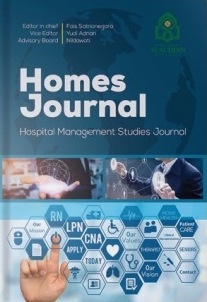MANAGEMENT NUTRITION FULFILLMENT OF NON CASH FOOD ASSISTANCE (BPNT)
Abstract
Backround: The Non-Cash Food Assistance Program (BPNT) is a type of direct community assistance to provide basic necessities with the aim of allowing people to consume better food and nutrition.
Objective: This study aims to management nutrition fullfillment of Non Cash Food Assitance (BPNT).
Method: This research usesmix method. The population in this study were all households receiving the Gowa Regency Non-Cash Food Assistance Program (BPNT).
Result: In this research, recipients of non-cash food assistance (BPNT) have utilized family food access assistance by >50% or around 329 people, and there are still 21 people (4.64%) who have not maximized BPNT for family food access. 100% of recipients receive BPNT of <Rp. 300,000/month and allocate <Rp. 300,000 for purchasing food/food.
Conclusion: Basically, the distribution of BPNT in Gowa Regency has an impact on improving welfare and fulfilling the economy as well as meeting basic needs, especially food.
References
Annisaulkhairi & Nurdin M N. (2023). Analysis of the Food Quality and Nutritional Status of Toddler from the Family of Program Beneficiaries of the Indonesian Conditional Cash Transfer Program. Jurnal Gizi Dietetik, 2(1), 31 – 36. https://journal.ipb.ac.id/index.php/jgizidietetik/issue/view/3224
Aisya T, Sukmawati C, Hasyem M, Aklima N. (2021). The Effectiveness of the Non-Cash Food Assistance Program (BPNT) during the Covid-19 Period in Bireuen Regency. Jurnal Ilmu Sosial dan Ilmu Politik Malikussaleh, 2(2), 206 – 217. https://doi.org/10.29103/jspm.v2i2.5202
Aspar & Syakhruddin. (2019). Implementation Of Non Cash Food Assistance Programs On Family Recipients In Kelurahan Bontoduri Kecamatan Tamalate Makassar City. Jurnal Berita Sosial, 9(2), 61-81.
B., Kanjilal, Mazumdar P.G., , and Rahman M.H. (2016). Nutritional Status of Childrenin India: Household Socio-Economic Condition as the Contextual Determinant, Int J Equity Health, 9(19), 1-10. https://doi.org/10.1186/1475-9276-9-19
Badan Pusat statistik. (2021). Data dan Informasi kemiskinan Tahun 2021. Jakarta Pusat : Badan Pusat Statistik. https://www.bps.go.id/id/publication/2021/11/30/9e3602ea496ecc2f4751836f/data-dan-informasi-kemiskinan-kabupaten-kota-tahun-2021.html
Badan Penelitian dan Pengembangan Kesehatan. (2018). Laporan Nasional Riskesdas 2018. Kementerian Kesehatan Republik Indonesia. https://repository.badankebijakan.kemkes.go.id/id/eprint/3514/
Cahyono SAT, Iryani SW. (2018). Gerak langkah Program Keluarga Harapan: Konstribusi Program Keluarga Harapan terhadap kesejahteraan Keluarga Penerima Manfaat. Jurnal Penelitian Kesejahteraan Sosial, 17(4), 1-10. https://doi.org/10.31105/jpks.v17i4
Cruz, L. M. G., Azpeitia, G. G., Súarez, D. R., Rodríguez, A. S., Ferrer, J. F. L., & Serra-Majem, L. (2017). Factors Associated with Stunting among Children Aged 0 to 59 Months from the Central Region of Mozambique. Nutrients, 9(5), 491. https://doi.org/10.3390/nu9050491
Iwan H., Izzaty, Eka Budiyanti, Rafika Sari, Yuni Sudarwati, dan Mohammad Teja. (2021). The Effectiveness of Non-Cash Food Assistance Program in Yogyakarta City. Jurnal Ekonomi & Kebijakan Publik, 12(2), 131 – 145. https://doi.org/10.22212/jekp.v12i2.2237
Ilman, A.S. (2019). Dampak tingginya harga pangan terhadap Bantuan Pangan Non-Tunai (BPNT) di Indonesia, Studi kasus di Nusa Tenggara Timur. Makalah Kebijakan No. 26. Jakarta: Center for Indonesian Policy Studies. https://doi.org/10.35497/300890
Junaidi, M.S., Setiawan, B.M., & Prastiwi, W.D. (2017). The satisfaction comparison of Bantuan Pangan Non Tunai recipients and Rastra recipients in Cakung District, East Jakarta. Jurnal Ilmiah Econosains, 15(2), 273-288. https://doi.org/10.21009/econosains.0152.08
MCA Indonesia. (2017). Stunting dan Masa Depan Indonesia. Millenn Chall Acc - Indonesia.
MSC. (2019). BPNT operations assessment. Jakarta: MicroSave Consulting.
Mukherjee M. (2016). Nutritional status of children in India: Household socio-economic condition as the contextual determinant. Int J Equity Health, 9(19), https://doi.org/10.1186/1475-9276-9-19
Müller O, Krawinkel M. (2015). Malnutrition and health in developing countries. CMAJ. https://doi.org/10.1503/cmaj.050342
Nasution, A., Krisnamurthi, B., & Rachmina, D. (2020). Analisis permintaan pangan rumah tangga penerima manfaat Bantuan Pangan Non Tunai (BPNT) di Kota Bogor. Forum Agribisnis (Agribusiness Forum), 10(1), 1-10. https://doi.org/10.29244/fagb.10.1.1-10
Nasriyah N, Rusnoto R, Supriyanto S. (2022). Optimalisasi Perbaikan Gizi Keluarga dalam pencegahan stunting melalui pemberdayaan masyarakat. Jurnal Abdimas Indonesia, 4(2), 128 – 135.
https://doi.org/10.26751/jai.v4i2.1702
Nurhayati. (2019). Analisis komparasi evaluatif atas Program Bantuan Pangan di Desa Sojomerto Kecamatan Gemuh Kabupaten Kendal. Skripsi. Semarang: Universitas Diponegoro.
Permensos No 11 Tahun 2018. (2018). Penyaluran Bantuan Pangan Non Tunai. Menteri Sosial Republik Indonesia
Paudel R, Pradhan B, Wagle RR, Pahari DP, Onta SR. (2017). Risk factors for stunting among children: A community based case control study in Nepal. Kathmandu Univ Med J, 10(39), 18-24. https://doi.org/10.3126/kumj.v10i3.8012
Probohastuti NF, Rengga A. (2019). Implementasi kebijakan intervensi gizi sensitif penurunan stunting di Kabupaten Blora. Journal of Public Policy and Management Review. 8(4), 1-16. https://doi.org//jppmr.v8i4.24936
Rachman, B., Agustian, A., & Wahyudi. (2018). Efektivitas dan perspektif pelaksanaan Program Beras Sejahtera (Rastra) dan Bantuan Pangan Non-Tunai (BPNT). Analisis Kebijakan Pertanian, 16(1), 1-18. https://doi.org/10.21082/akp.v16n1.2018.1-18
Reurings M, Vossenaar M, Doak CM, Solomons NW. (2018). Stunting rates in infantsand toddlers born in metropolitan Quetzaltenango, Guatemala. Nutrition, 29(4), 1-9. https://doi.org/10.1016/j.nut.2012.12.012
Risnandar & Broto, A.W. (2018). Implementasi program bantuan sosial non tunai di Indonesia. Sosio Konsepsia, 7(3), 146-161. https://doi.org/10.47134/aksiologi.v2i2.68
Rosalina, Ana. (2019). Efektivitas Pelaksaaan Bantuan Pangan Non Tunai (BPNT) di Kecamatan Wanocolo, Public Administration Journal of Research 1(2), 96-111. https://doi.org/10.33005/paj.v1i2.13
Syafruddi, Ikbal M, Kalrah A. (2021). Efektivitas Program Bantuan Pangan Non Tunai Terhadap Kesejahteraan Masyarakat Desa Maddenra Kecamatan Kulo Kabupaten Sidenreng Rappang. Jurnal JIA, 9(2), 104 – 110. https://doi.org/10.26740/publika.v5n3.p%25p
Wiwit, Sulistyaningsih, T., & Kamil, M. (2020). Monitoring dan evaluasi kebijakan Program Bantuan Pangan Non Tunai (BPNT) dalam penanggulangan kemiskinan di Kota Batu. Government: Jurnal Ilmu Pemerintahan, 13(1), 1-12. https://doi.org/10.31947/jgov.v13i1.9379


